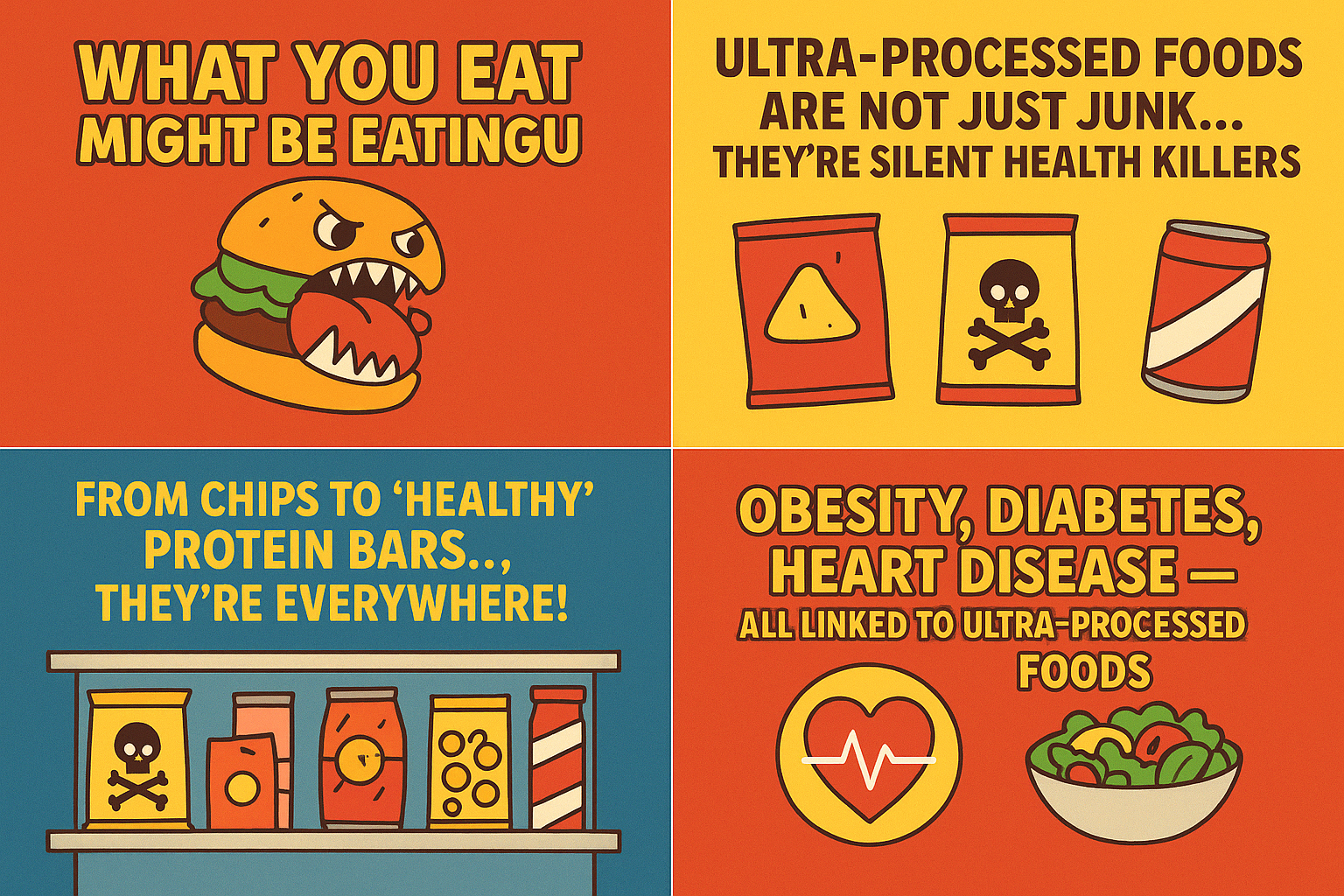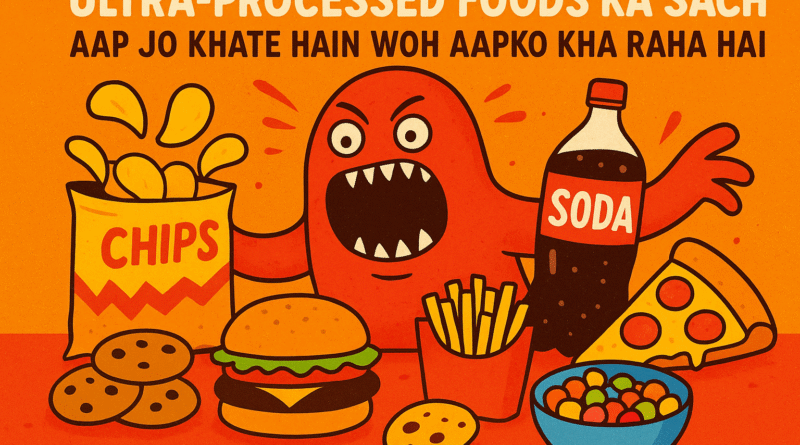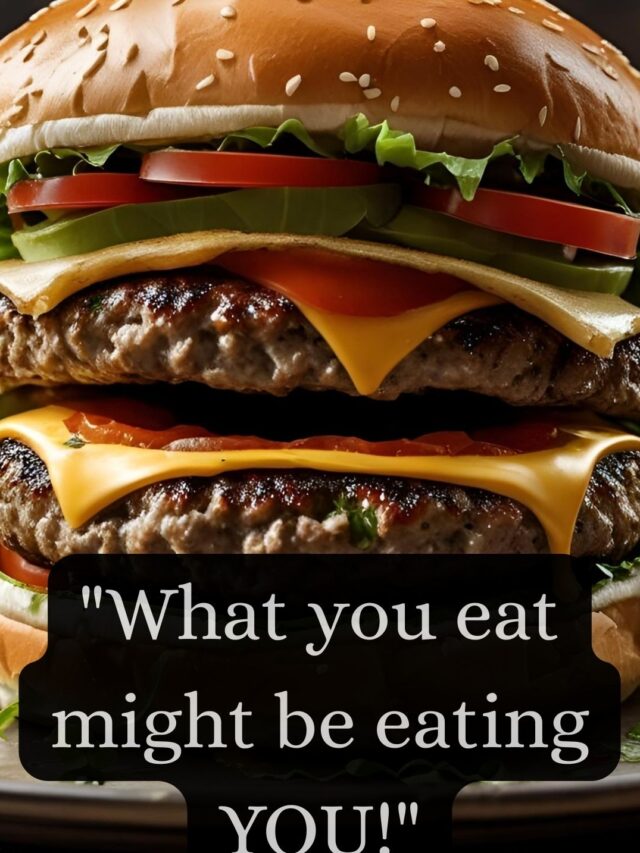Processed Food Dangers: Are You Eating Food, or Is Food Eating You | Ultra-Processed Foods: The Shocking Truth
It All Started with a Packet of Chips…
It was a busy Monday evening. Priya had just returned home from work, tired and too drained to cook. She opened the kitchen cupboard and found a shiny packet of her favorite potato chips.
“Just a small snack,” she thought. She sat on the couch, turned on Netflix, and before she knew it… the packet was empty.
A few hours later, she felt bloated, thirsty, and strangely hungry again. The chips didn’t really fill her stomach, but they sure filled her body with salt, unhealthy fats, and chemical additives she couldn’t even pronounce.
This is how most of us live today—ultra-processed foods have silently taken over our kitchens, our lunch breaks, and even our midnight cravings. But here’s the shocking part: what we eat is slowly eating away our health.

What Are Ultra-Processed Foods?
Ultra-processed foods are not just “junk food.” They are industrial creations—formulated in factories using refined ingredients, artificial flavors, preservatives, emulsifiers, and additives. They are designed to taste irresistible, last longer on shelves, and keep you coming back for more.
Some common examples:
- Packaged chips, biscuits, and instant noodles
- Sugary breakfast cereals
- Ready-to-drink sodas and flavored juices
- Frozen pizzas and ready meals
- Processed meats like sausages and salami
The Silent Health Trap
Ultra-processed foods don’t just fill your stomach—they fool your brain, overload your body with chemicals, and damage your long-term health.
- They Make You Overeat
Ever wondered why you can’t stop after just “one” cookie? These foods are engineered for hyper-palatability—the perfect mix of salt, sugar, and fat that triggers your brain’s reward system. They make you crave more, even when your body doesn’t need more energy.
- Nutritional Value is Almost Zero
Most ultra-processed foods are stripped of natural nutrients. They lack fiber, vitamins, and minerals but are loaded with empty calories. Your body ends up calorie-rich but nutrient-poor.
- Linked to Chronic Diseases
Research shows that high consumption of ultra-processed foods increases the risk of:
- Obesity
- Type 2 Diabetes
- Heart Diseases
- Cancer
- Depression
- Additives & Preservatives Damage Your Body
Ingredients like MSG (Monosodium Glutamate), artificial sweeteners, and coloring agents can disrupt your gut health, hormonal balance, and even brain function.
Why Are We So Addicted?
It’s not your fault if you can’t say no to chips or instant noodles. These foods are designed for maximum addiction.
- Convenience: Ready in minutes, no cooking required.
- Marketing Tricks: Bright packaging, celebrity endorsements, and catchy slogans make them irresistible.
- Emotional Comfort: Many of us eat these foods when stressed, bored, or sad.
This creates a cycle: The more you eat, the more you crave.
Real-Life Warning Signs
If you experience any of these regularly, ultra-processed foods might be the reason:
- Constant cravings for salty, sweet, or fried food
- Feeling tired even after eating
- Bloating or digestive problems
- Unexplained weight gain
- Skin breakouts or dullness
A Shocking Reality – They Are Everywhere!
You might think, “I don’t eat junk food every day.” But ultra-processed foods are hiding in places you don’t even expect:
- “Healthy” protein bars
- Flavored yogurts
- Packaged breads and buns
- Salad dressings
- Instant soups
They may look healthy on the outside, but inside, they are full of hidden sugars, refined oils, and additives.
What Happens When You Quit Ultra-Processed Foods?
People who cut down on ultra-processed foods often notice:
- Better digestion and less bloating
- Stable energy throughout the day
- Clearer skin
- Improved mood and sleep
- Healthy weight loss without extreme dieting
How to Escape the Trap
- Read Food Labels
Check the ingredient list. If it has too many chemical names you can’t pronounce, it’s probably ultra-processed.
- Cook More at Home
Even simple meals like dal-chawal, fresh salads, or vegetable stir-fry are healthier than any packaged snack.
- Choose Whole Foods
Fruits, vegetables, nuts, whole grains, and fresh dairy are nutrient-dense and free from harmful additives.
- Limit Sugary Drinks
Replace sodas and packaged juices with water, coconut water, or homemade lemon juice.
- Practice Mindful Eating
Don’t eat in front of the TV or phone. Focus on your meal and stop when you’re full.
The Emotional Side of Eating
Ultra-processed foods often replace family meals and real conversations. They make us forget the joy of fresh-cooked food and turn eating into a mindless act. This not only affects our physical health but also our mental and emotional well-being.
Small Steps, Big Changes
You don’t have to give them up overnight. Start with small swaps:
- Replace chips with roasted makhana or nuts
- Switch sugary cereals for oats with fruits
- Make your own sandwich spread instead of using packaged sauces
The Bottom Line
Ultra-processed foods are not just bad for you—they are silently consuming your health. Every bite might bring you instant pleasure, but it also brings long-term damage.
The real question is: Are you eating food, or is the food eating you?
Choose fresh, whole, and minimally processed foods whenever you can. Your future self will thank you for every healthy choice you make today.
ultra-processed foods, harmful effects of junk food, unhealthy packaged foods, processed food dangers, why junk food is bad, health effects of processed foods, dangers of ultra-processed food, avoiding junk food, healthy eating tips, processed food vs whole food

